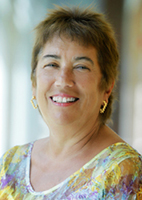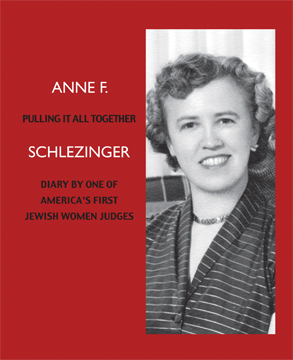Shulamit Reinharz, Ph.D.

Shulamit Reinharz
The Integrated Life Of A Modern American Woman:
Anne Freeling Schlezinger, 1910-1978
“My Little Page”
"Many young people begin a diary with the hope of creating a record of their lives, but most soon give up the practice of regular writing. Anne Freeling Schlezinger was an exception. For forty-seven years starting in 1931 when she was 21, Anne adhered strictly to a daily writing schedule. Her persistence in sustaining her diary was probably facilitated by her decision to write extremely brief entries, almost like those of a farmer’s almanac. For this reason, even if she had only a few minutes to spare on a given day, she most likely could manage the 70-100 words of her typical entry right before going to sleep at night.
"What is particularly remarkable about Anne’s diary, in addition to its longevity and completeness, is its uniformity. For nearly half a century, Anne produced a bare bones daily outline of her experiences, almost always using the same entry topics: the weather, mail and phone calls she received, her meals, her social life, her shopping, her job, her family, her entertainment and her health. She noted the content of her work occasionally and offered only meager comments on world events. Her entries read like telegrams.
"They revolve around these selected themes, hardly varying at all. This manner of writing creates an impression of the writer as a cool, calm, collected personality. But it has a negative consequence as well. All the information appears to have equivalent significance. It is impossible to know what was truly important to her, and what was not. A striking example is the following complete entry:
"Thursday, November 13, 1952. Doherty had been reclassified to the same grade as mine, a grade I had when he first came to the Board. The other supervisors are dropping their appeal for reclassification, however, as they are afraid it will make them more vulnerable to discharge when the administration changes. Lunched in the cafeteria with Almira Stevenson. Had coffee in the afternoon with Stasi Dunan. Abe Feller, whom I knew at Justice, committed suicide. Very depressing. Ira missed his Scout meeting – too much homework. Expect he would have brushed it off but for his report card. To the National Theater with Ira and Alice Jaffee to see Phil Silvers in “The Top Banana,” a zany thing but I was in just the mood for it, and so was Jules.
"In this entry, Anne begins with a statement illustrating employment discrimination against her as a woman. She comments next about the way the change from the Democratic (Truman) to Republican (Eisenhower) administration makes civil service employees vulnerable. She mentions her lunch with her regular companion, Almira Stevenson, and having an afternoon coffee with another friend. The next sentence however, concerns the suicide of a person she knew from work. “Very depressing,” is her entire commentary. This brevity is extraordinary because Feller’s suicide was related directly to the kinds of interrogation to which she, herself, had been subjected. Perhaps the very appearance of an extra two-word phrase indicated that this was an important topic. And perhaps she did not write more on this topic lest her diary be confiscated via subpoena. “Ira missed his Scout meeting – too much homework,” she continued, as if the nationally reported suicide and her child’s homework were equivalent. “Expect he [Ira] would have brushed it off but for his [bad] report card.” And then, she’s off for entertainment: “To the National Theater with Ira and Alice Jaffee to see Phil Silvers in ‘The Top Banana,’ a zany thing but I was in just the mood for it, and so was Jules.” She was in the mood for zaniness after news of the suicide? Perhaps that’s the way her personality worked – always seeking balance.
"Even though from an outside perspective the years of Anne’s life can be grouped into distinctive time periods (1931-1934: Law School and Graduation; 1935-1938: Washington and Professional Growth; 1939-1945: Marriage, Mothering, and World War II; 1946-1952: Professional Life and Silver Spring; 1953-1961: McCarthyism and the Struggle to Survive; 1962-1967: Mature Years; and 1968-1978: Grandmother and Judge), Anne comments only briefly on these grand topics, perhaps because she did not set out to write her diary with a serious purpose in mind. In fact, she claims (in 1961), to not know at all why she is writing her diary. Her entry about the topic of the diary itself, written 30 years after she began, is one of the longer reflections:
"Often wonder why, after all these years, I continue to write these fool things. I almost never look back in them for any purpose, and do not suppose, in view of the great number of these books that I am accumulating, that I ever shall go back over them. By the time I have the time, I shall probably not have the eyesight. But I suppose, if it serves no other purpose, it is a form of self-discipline as I write my little page even when I find it a considerable bore and a great nuisance. Nor do I suppose that all this blithering will be of the slightest interest to Ira [her son] or to those who come after him."
Gaon Books
P.O. Box 23924
Santa Fe, NM 87502
505.920.7771
gaonbooks@gmail.com
Gaon Books
Excellence in Publishing
All images and texts in this website are under copyright.
To use materials please contact Gaon Books

